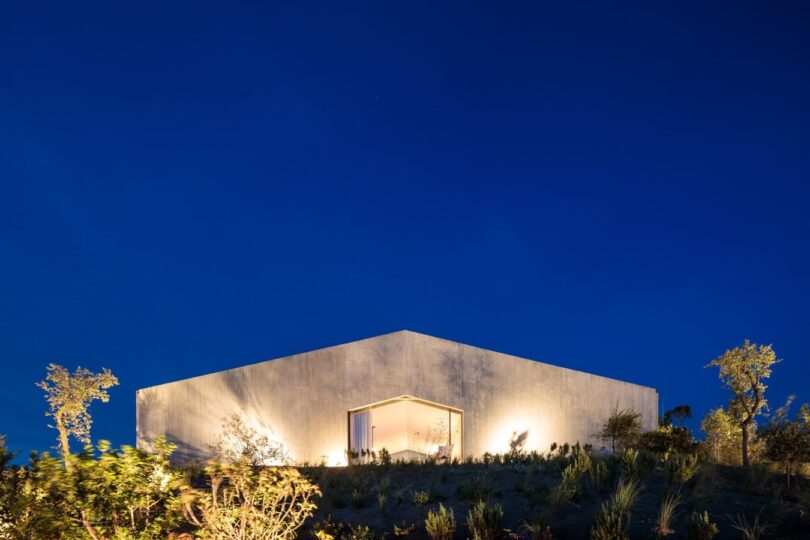One of the four houses at Pa.te.os
Sometimes, in a few particularly special corners of the world, you can drive just a little more than one hour from a world capital and find yourself in utter silence, in deep communion with nature. Sometimes you even kind of forget that cities exist. You just ease into the rhythm of doing nothing more than appreciating the beauty of your surroundings. Pa.te.os, in the increasingly fashionable Portuguese enclave of Melides, is one of those places.
“Slow living” has become a travel writing and influencing cliché. But it’s still the best way to describe what one does at Pa.te.os. You walk slowly. You sit still. You take in the landscape of Portugal’s northern Alentejo region. Even the periods in the name are meant to reinforce the idea of slowness, said co-owner Miguel Charters over a dinner of simple but perfectly cooked fish made by the property’s private chef.
The pool at Pa.te.os
Punctuation aside, it’s pronounced pateos (pah-tey-os), the Portuguese word for “patios.” That’s because the design, by esteemed Portuguese architect Manuel Aires Mateus, emphasizes the concept of patios (or courtyards). It’s an architectural style carried over from southern Portugal’s years of Arab influence, in which interior and exterior spaces blend together, connect with nature and take advantage of the seemingly endless sunshine of the Alentejo.
Charters and his wife, Sofia, acquired the property 15 years ago with the idea of building a small, unpretentious villa compound where they could host family and friends. As these things often do, it evolved into a formal tourism project that now welcomes guests from around the world—with the idea of showing a personal version of “what Alentejo means to them.” The couple remained closely involved throughout the construction and now in the hospitality.
The living room in a house at Pa.te.os
The accommodations are deceptively simple: four separate houses that together sleep 14 people and share a heated swimming pool. (The place can be rented as an entire compound or as individual houses, and it’s generally self-catering although private chefs can be arranged.) They’re close to one another but positioned in a way that makes each one feel deliciously isolated. Rather than doors, each house is fronted with retractable windows.
When the yoga teacher (excellent, by the way) turned up for a private session during the morning of my stay, he slid back the glass, and I felt a connection with the cork oaks, olive trees and arbutus, and the Arrábida hills and the Atlantic beyond, even in the shade of my living room. (I may love the endless sunshine of the Alentejo, but my pale skin does not.)
THe view from a house at Pa.te.os
In fact, that’s what Pa.te.os is about: living in touch with nature but not losing the comfort of shelter. And that shelter is simple until you look at the details. There’s a great deal of subtlety, but the houses are works of art, not screaming with bling but purring with quality and comforting textures such as raw concrete and European oak that create a sensory experience.
In a country as rich in artisanal traditions and creative artistry as Portugal is, any small hotel or villa should emphasize manual work and craftsmanship done by master carpenters, stucco workers and stonemasons. Although some Italian and Scandinavian pieces complete the design, Pa.te.os fits that bill. The nature-based artworks are the contribution of Portuguese artist Olga Sanina, who collected local foliage and turned them into framed collages in the houses’ living rooms.
Pa.te.os as seen from above
Likewise, the breakfast, which is included in a stay and delivered to the houses each morning, features infusions with herbs from the garden (the in-room espresso machines take care of the caffeine), freshly squeezed juice, fruits from the farm and homemade granola. Staffers come and set the breakfast table quietly so that guests wake up to find everything ready.
Because a signature scent is also somewhat mandatory now, noted British perfumer Lyn Harris came up with an exclusive fragrance that balances the freshness of Melides’s pine forest with the saltiness of the nearby coastline. Aromas of earth, stone and wood glimmer in the background, perfectly in line with the subtlety that makes Pa.te.os such a singular place.








